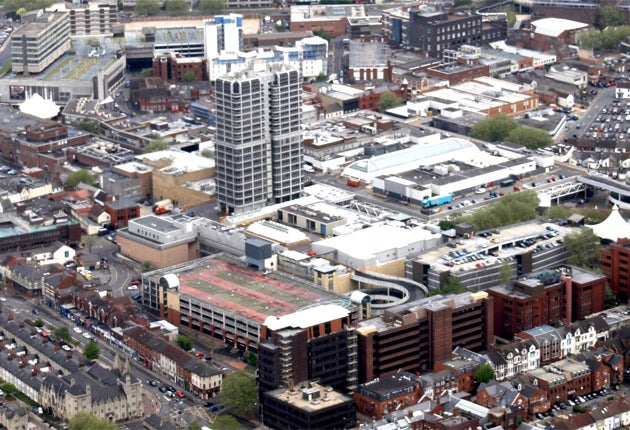Turn off your living-room light from the office? You can in Swindon ...
Wiltshire town stakes claim to be Britain's most advanced with wi-fi plan

In its illustrious history, Swindon has notched up a number of impressive firsts. Alongside the planet's first recorded railway refreshment rooms, the Wiltshire town pioneered xylophone lessons for Victorian labourers and more recently took the enlightened step of abolishing all of its fixed-point speed cameras.
But far from resting on its laurels, the hitherto unsung technological hub of the M4 corridor yesterday announced its latest initiative to blaze a trail of technical and social innovation for the rest of Britain to follow – free wireless internet for its entire population of 186,000 souls.
With the rest of the country languishing on average broadband speed of 4Mbp (megabits per second), the citizens of Swindon will be zipping through cyberspace at a speed of up to 20Mbp by next spring under a £1m public-private sector venture involving the town's council and a local entrepreneur.
Organisers painted a picture of an ultra-modern community where security-conscious homeowners could monitor remote CCTV cameras in the sitting room while in the supermarket, and eco-friendly residents will switch off their house lights from the office.
The scheme, which would be the first to provide free wi-fi access to a whole town in Britain, could provide a blueprint to bring internet speeds in the UK up to the level of competitors including the Netherlands, Japan and Sweden, which have average speeds of 20Mbp or above.
A survey last month ranked Britain 25th in a list of the 66 most advanced nations in terms of the quality of their internet networks.
The Swindon network, which will be called Signal, will operate by installing a matrix of 1,400 high-powered routers on top of lampposts to create a wi-fi "mesh" across town accessible to anyone with a wireless-enabled computer. The first neighbourhoods will be connected by the beginning of next month with the whole of the town connected by the end of April 2010.
Rod Bluh, leader of the Conservative-controlled Swindon Borough Council, which announced a year ago that it was withdrawing funding for its speed cameras and would demolish them within six months, said: "We are not doing these things to gain publicity. We are an out of the box council and we are trying to re-shape the public sector model.
"Residents will not only be able to access the internet for free but we will be able to use the technology to provide services from home security to health care in a way that has not been done before. It will also provide us with a revenue stream and expertise that can be provided to other local authorities."
But before the surfing denizens of Swindon, whose civic motto is "health and industry", begin salivating at the prospect of receiving for nothing a service which the rest of the population pays about £15 a month from established providers, they should read the small print.
The wi-fi access will be free for the first two hours of use every day but beyond that users will have to subscribe to a monthly subscription or a pay-as-you-go model. The subscription is expected to begin at about £6.99 a month with extra fees for services such as a permanent link to an eco-friendly electricity meter that would allow users to switch appliances on or off remotely and security cameras set up inside a subscriber's home linked to a monitoring centre.
The local authority, which has a 35 per cent stake in the holding company for Signal, will receive a share of the revenue as well as part of the proceeds if, as hoped, the technology is adopted by other communities in Britain.
On the streets of the town, whose humble origins as a village named by Anglo-Saxons as "pig hill" were transformed when it became a centrepoint for Brunel's Great Western Railway, there was a broad welcome for the venture. Swindon has a long history of improving the lot of its residents, with the establishment of a medical fund for GWR workers in the 1870s which became a model for the NHS.
Asked about the latest example of civic beneficence, one shopper said: "It's about time we had something useful in Swindon."
Others were less impressed. Mohammed Afrah, owner of an internet cafe, said: "A free internet service for the whole of Swindon isn't great for a business that charges to access it."
Although similar schemes are common in the US, the only other attempt to provide city-wide wi-fi in the UK foundered in Norwich two years ago after funding for the project ran out.
Rikki Hunt, the former chairman of Swindon FC and the businessman who set up the scheme, said: "We've already had expressions of interest from several towns in the South-west about adopting the model. But first we have to prove it works in Swindon and we are very confident indeed that it will."
Full steam ahead: Swindon’s claims to fame
*Up until the mid-1800s Swindon was a small market town.
*Its motto is “Salubritas et Industria” (health and industry).
*Swindon Junction station opened in 1842 and until 1895 every train stopped for at least 10 minutes to change locomotives.
*The station hosted the first recorded railway refreshment rooms.
*More people have joined the Hare Krishna movement in Swindon than in any other English town.
*The town is also known for its roundabouts.
*Eddie Izzard, the comedian, once based a 1960s fictitious British moon landing in Swindon.
Join our commenting forum
Join thought-provoking conversations, follow other Independent readers and see their replies
Comments
Bookmark popover
Removed from bookmarks